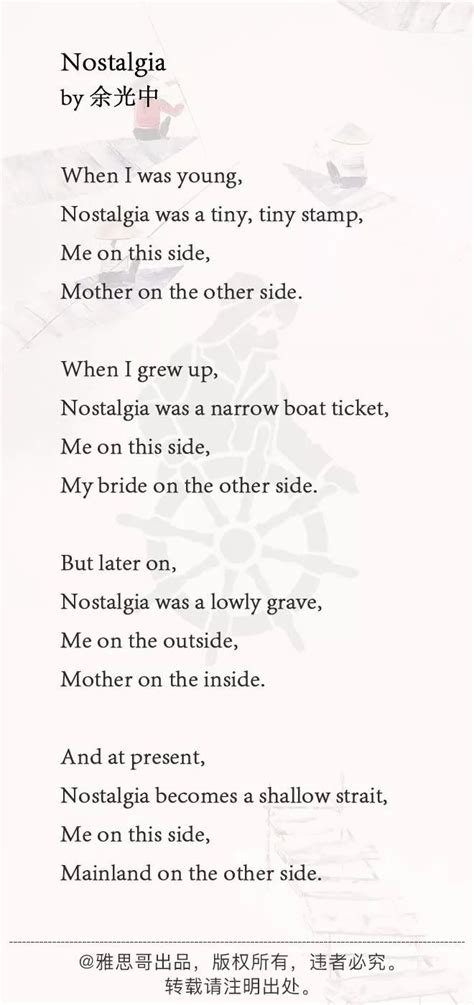诗歌英语怎么说
Exploring the Beauty of Poetry through English
Poetry, a timeless form of artistic expression, transcends cultural boundaries and resonates deeply with the human soul. Through the intricate weaving of words, poets capture emotions, experiences, and perspectives, inviting readers into worlds both familiar and unknown. In this exploration, we delve into the richness of poetry in the English language, unraveling its nuances, and celebrating its power to inspire, provoke, and move.
The Essence of English Poetry:

English poetry boasts a rich heritage spanning centuries, from the lyrical verses of Shakespeare to the modernist experiments of T.S. Eliot. Its diversity is evident in various forms such as sonnets, ballads, haikus, and free verse, each offering a unique canvas for poetic expression.
Savoring Sonnets:
One of the most beloved forms of English poetry is the sonnet, characterized by its fourteen lines and structured rhyme scheme. The Shakespearean sonnet, with its ABABCDCDEFEFGG rhyme scheme, is a classic example. It allows poets to explore themes of love, mortality, and the passage of time with elegance and depth.
Captivating Haikus:
Haiku, originating from Japanese tradition, has found a home in English poetry as well. With its threeline structure comprising seventeen syllables (575), haiku captures fleeting moments of beauty and contemplation. Its brevity challenges poets to distill profound insights into a few carefully chosen words.
Embracing Free Verse:
In contrast to structured forms, free verse offers poets the freedom to experiment with rhythm, line breaks, and imagery. Without the constraints of rhyme or meter, poets can explore the full range of human experience in a fluid and organic manner. This form has been embraced by modern poets seeking to break away from traditional conventions and explore new frontiers of expression.
Themes and Motifs:
English poetry encompasses a myriad of themes, ranging from nature and spirituality to politics and identity. Poets draw inspiration from their surroundings, inner conflicts, and the human condition, weaving these elements into tapestries of verse that resonate with readers on a deeply personal level.
Guiding Lights:
For aspiring poets, studying the works of renowned English poets can serve as both inspiration and education. From the romantic lyricism of William Wordsworth to the bold experimentation of Sylvia Plath, each poet offers valuable insights into the craft of poetry, inviting readers to explore their own unique voices and perspectives.
Conclusion:
In the vast landscape of English poetry, there is a poem for every mood, every moment, and every individual. Whether exploring the timeless classics or embracing contemporary voices, delving into the world of English poetry is a journey of discovery, reflection, and appreciation. So let us immerse ourselves in the beauty of words, and let poetry illuminate our lives with its timeless wisdom and boundless imagination.
This exploration of English poetry is but a glimpse into its vast and everevolving landscape. May it inspire readers to embark on their own poetic journeys, discovering the beauty and power of language one verse at a time.
```html
Exploring the Beauty of Poetry through English
Poetry, a timeless form of artistic expression, transcends cultural boundaries and resonates deeply with the human soul. Through the intricate weaving of words, poets capture emotions, experiences, and perspectives, inviting readers into worlds both familiar and unknown. In this exploration, we delve into the richness of poetry in the English language, unraveling its nuances, and celebrating its power to inspire, provoke, and move.
English poetry boasts a rich heritage spanning centuries, from the lyrical verses of Shakespeare to the modernist experiments of T.S. Eliot. Its diversity is evident in various forms such as sonnets, ballads, haikus, and free verse, each offering a unique canvas for poetic expression.
One of the most beloved forms of English poetry is the sonnet, characterized by its fourteen lines and structured rhyme scheme. The Shakespearean sonnet, with its ABABCDCDEFEFGG rhyme scheme, is a classic example. It allows poets to explore themes of love, mortality, and the passage of time with elegance and depth.
Haiku, originating from Japanese tradition, has found a home in English poetry as well. With its threeline structure comprising seventeen syllables (575), haiku captures fleeting moments of beauty and contemplation. Its brevity challenges poets to distill profound insights into a few carefully chosen words.
In contrast to structured forms, free verse offers poets the freedom to experiment with rhythm, line breaks, and imagery. Without the constraints of rhyme or meter, poets can explore the full range of human experience in a fluid and organic manner. This form has been embraced by modern poets seeking to break away from traditional conventions and explore new frontiers of expression.
English poetry encompasses a myriad of themes, ranging from nature and spirituality to politics and identity. Poets draw inspiration from their surroundings, inner conflicts, and the human condition, weaving these elements into tapestries of verse that resonate with readers on a deeply personal level.
For aspiring poets, studying the works of renowned English poets can serve as both inspiration and education. From the romantic lyricism of William Wordsworth to the bold experimentation of Sylvia Plath, each poet offers valuable insights into the craft of poetry, inviting readers to explore their own unique voices and perspectives.
In the vast landscape of English poetry, there is a poem for every mood, every moment, and every individual. Whether exploring the timeless classics or embracing contemporary voices, delving into the world of English poetry is a journey of discovery, reflection, and appreciation. So let us immerse ourselves in the beauty of words, and let poetry illuminate our lives with its timeless wisdom and boundless imagination.
This exploration of English poetry is but a glimpse into its vast and everevolving landscape. May it inspire readers to embark on their own poetic journeys, discovering the beauty and power of language one verse at a time.
